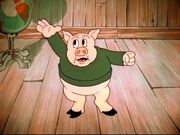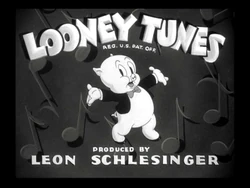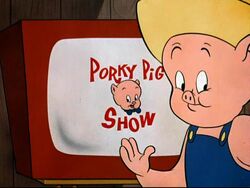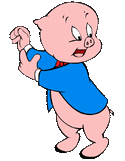Porky Pig is an animated cartoon character in the Warner Bros. Looney Tunes and Merrie Melodies series of animated cartoons. He was the first character created by the studio to draw audiences based on his star power, and the animators (particularly Bob Clampett) created many critically acclaimed shorts using the fat little pig. Porky was once the star of the show before being replaced by Bugs. Even after he was supplanted by later characters, Porky continued to be popular with moviegoers and, more importantly, the Warners directors, who recast him in numerous everyman and sidekick roles. He is known for his signature line at the end of each short, "Th-th-that's all folks!" but in fact this slogan had been used by both Bosko and Buddy and even Beans at the end of every Looney Tunes cartoon. In contrast, the Merrie Melodies series used the slogan: So Long, Folks! until the late 1930's when it was replaced with the same one used on the Looney Tunes series.
Early films

Porky as he first appeared in I Haven't Got a Hat.
The character was designed by animator Bob Clampett and introduced in the short I Haven't Got a Hat (first released on March 2, 1935), directed by Friz Freleng. Studio head Leon Schlesinger suggested that Freleng do a cartoon version of the popular Our Gang films. Porky only has a minor role in the film, but the fat little stuttering pig easily steals the show. Porky's name came from two brothers who were childhood classmates of Freleng's, nicknamed "Porky" and "Piggy".[1]
Since Hugh Harman and Rudolf Ising had left the studio in 1933, taking the studio's star character Bosko with them, Looney Tunes had been kept afloat by cartoons featuring the bland Buddy. Porky's introduction ushered Buddy out the door and pointed to things to come. Tex Avery was hired to the studio in 1936, and his film Gold Diggers of '49 reused much of the cast from I Haven't Got a Hat, albeit in wildly different roles. Porky transitioned from a shy little boy to an immensely fat adult. Though he was still in a supporting role, Porky got most of the laughs. The directors realized they had a star on their hands.
This early Porky shared his stutter with the voice actor who originally played him, Joe Dougherty. Because Dougherty could not control his stutter, however, production costs became too high. The versatile Mel Blanc won the audition for the character in 1937, beginning his long career with the studio. Blanc continued the stutter, however it was reduced.
Clampett's Porky

Porky Pig signing off in a 1930s Looney Tune short.
Porky starred in dozens of films in the late 1930s. The directors still didn't have a grasp on the character, however; his appearance, age, and personality all varied from picture to picture. Bob Clampett would finally pin Porky down, making him cuter, smarter, and less of a stutterer. Clampett's Porky was an innocent traveler, taking in the wonders of the world -- and in Clampett's universe, the world is a very weird place indeed. This principle is perhaps best demonstrated in Porky in Wackyland (1938),

Bob Clampett's Porky Pig.
a film that sends Porky on a quest to find the last of the Dodos. This cartoon was selected for preservation by the National Film Registry in 2000.
Porky as sidekick
thumb|300px|right Porky's post at the pinnacle of the Warners' pantheon was short-lived however. In 1937, Avery pitted Porky against a plucky black duck who would soon be christened Daffy and would become the studio's biggest star (until replaced himself by Bugs Bunny). In fact, Friz Freleng would satirize this very phenomenon when he directed You Ought to Be in Pictures (1940). The film features up-and-comer Daffy convincing Porky to quit his job at Warner Bros. to find better-paying work elsewhere. In turn, Porky convinces studio head Leon Schlesinger to release him from his contract. After a highly unsuccessful foray into the real world, Porky returns happily to the studio that created him.
Porky always remained a sentimental favorite of the Warner directors. His mild-mannered nature and shy demeanor made him the perfect straight man for zanier characters such as Daffy Duck. He still starred in a few solo cartoons, as well, such as Frank Tashlin's Swooner Crooner (1944). Other cartoons dumbed Porky down and cast him as a duck hunter after Daffy, largely paralleling the Elmer Fudd/Bugs Bunny pairings. Chuck Jones perfected the Porky-as-straightman scenarios, pairing the pig with Daffy Duck in a series of film parodies such as Drip-Along Daffy (1951), Deduce, You Say (1956), and Robin Hood Daffy (1958). Jones also paired Porky with Sylvester in a series of cartoons in the late 1940s and early 1950s, in which Porky plays the curmudgeonly owner of the cat and remains clueless that Sylvester is constantly saving him from homicidal mice, space aliens, and other threats. Porky, of course, also kept his trademark line, "Th'-th'-th'-th'-th'-th'-that's All, Folks!" that became the signoff for many Looney Tunes cartoons. Prior to Porky's arrival, the line had often been spoken (without the stutter) by a cartoon court jester. Sometimes Bugs Bunny would also do the honors; in those closing segments, Bugs would munch on a carrot and say, "And dat's de end!" But Porky's closing line was so memorable that Mel Blanc's will provided for it to be carved on his own headstone.
Later years

Porky Pig, as seen in the opening title sequence of The Porky Pig Show.
As did the rest of his Looney Tunes co-stars, Porky enjoyed regular rotation in television syndication beginning in the 1960s. In 1964, Porky got his own Saturday morning cartoon, The Porky Pig Show which ran until 1967. In 1971, he would star in another show, Porky Pig and Friends. Both of these programs were collections of old theatrical shorts. Another such collection was the 1986 film, Porky Pig in Hollywood, which ran in art and college theaters. In the 1990s animated series Tiny Toon Adventures, Porky appears as the mentor of Hamton J. Pig. Porky Pig also appears as the Eager Young Space Cadet in the animated television series Duck Dodgers.
In 1991, the National Stuttering Project (NSP) of San Francisco picketed Warner Bros. demanding that they stop "belittling" stutterers and use Porky Pig as an advocate for child stutterers. The studio refused the NSP, but eventually agreed to grant $12,000 to the Stuttering Foundation of America for a 1994 conference. After continued pressure from NSP member Ira Zimmerman, Warner Bros. released a series of public service announcement posters featuring Warners characters, including Porky himself, speaking out against bullying. Despite these recent protests, Porky continues to feature in new Warner Bros. animation to this day. An alternate school of thought is that the morally upright and ever-optimistic Porky provides a positive role model for stutterers.
In the movie Looney Tunes: Back In Action, Porky makes a cameo appearance alongside Speedy Gonzales, where they both lament their politically incorrect status. At the end of the movie, he also fails to deliver his ending quip before the studio closes, and just tells the audience to go home.
Porky is the star of the Super NES video game Porky Pig's Haunted Holiday.
Porky also has a cameo at the end of Who Framed Roger Rabbit? (1988), where, paired with Disney's Tinkerbell, has the duty of closing the movie with his famous "That's All Folks!" line.
Voice-Actors
- Joe Dougherty: 1935 - 1937
- Mel Blanc: 1937 - 1989
- Bob Bergen: 1990 - present
- Noel Blanc: Tiny Toon Adventures
- Jeff Bergman: The 1st 13th Annual Fancy Anvil Awards Show Program Special, Gremlins 2: The New Batch, The Earth Day Special, Cartoon Network Bloopers
- Billy West: My Generation G-G-G-Gap, Daffy Contractor
- Rob Paulsen: Animaniacs
- Seth MacFarlane: Family Guy
Gallery
- Main article: Porky Pig/Gallery
- ↑ Beck, Jerry. Audio commentary for "I Haven't Got a Hat" on the Warner Brothers D.V.D. set Looney Tunes Golden Collection, Volume 3. (2005) citing Freleng's autobiography.


